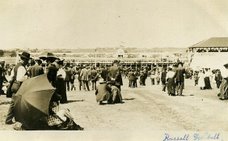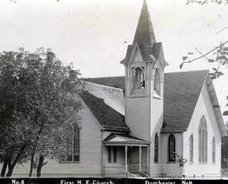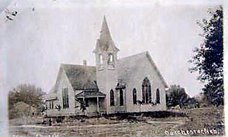
Let's look back on Dorchester's earliest recorded history and some of the area's first residents of European descent, as well as their interactions with Native Americans who roamed the region.
According to the Dorchester centennial history book, the first official survey of the Nebraska Territory was taken in 1857, shortly after the Kansas-Nebraska Act became law. The surveyor's notes for the Dorchester Precinct describe the area as having "generally level and gently rolling, good, second-rate soil." The West Fork of the Blue River was described as "clear with a very rapid current ... producing very fine cat fish and buffalo fish (carp)."
Two of the first families to settle in the Dorchester area were the Frink and West families.
In 1857 or 1858, Ephraim Frink and his wife Mary came from Pennsylvania and settled near Turkey Creek, just west of what is now Pleasant Hill. Soon after, the West family arrived in the area. Thomas West came from Iowa along with his family, and brought friends Orion Johnson and William Smith. Johnson built Saline County's first homestead just north of present-day Dorchester on the banks of Johnson Creek (pictured) and made some of the wooden burrs for the West Mills, the first grain mill between Nebraska City and the western states.

Soon after their arrival to Nebraska, Smith and West learned firsthand the dangers of living on the edge of the frontier. In the autumn of 1859, on a trip back to Dorchester from Nebraska City -- the nearest trading post -- Smith and West were confronted by a group of Pawnee Indians. Typically, the Pawnee posed little danger to white settlers. However, these particular Natives -- fearing that Smith and Johnson would report them for killing a heard of government-owned cattle -- tied up, tortured, and planned to shoot both West and Smith.
Using gestures and sign language, West convinced the Natives not to kill him and his partner. The Natives agreed to release them, but not before taking all their supplies and food they had purchased in Nebraska City. We st and Smith were then blindfolded for the rest of the day, driven in their oxen-led wagon for a length of time, and deserted on the prairie. For 16 days, the men wandered trying to find their way home, resorting at one point to killing a badger and eating it raw for nourishment.
st and Smith were then blindfolded for the rest of the day, driven in their oxen-led wagon for a length of time, and deserted on the prairie. For 16 days, the men wandered trying to find their way home, resorting at one point to killing a badger and eating it raw for nourishment.
 st and Smith were then blindfolded for the rest of the day, driven in their oxen-led wagon for a length of time, and deserted on the prairie. For 16 days, the men wandered trying to find their way home, resorting at one point to killing a badger and eating it raw for nourishment.
st and Smith were then blindfolded for the rest of the day, driven in their oxen-led wagon for a length of time, and deserted on the prairie. For 16 days, the men wandered trying to find their way home, resorting at one point to killing a badger and eating it raw for nourishment.
Mr. West's troubles with the Natives continue soon thereafter. In March 1860, the West family's log cabin was set on fire by the a band of Omaha Indians. Sioux Indians, meanwhile, killed many of the Frink family's cattle.
One of the most unfortunate confrontations between Natives and Dorchester-area settlers also occurred in 1860 -- when there were only around 30 residents in Saline County. A small party of Indians made a hostile raid on the Patton family, who had come from Kentucky and lived in the area southwest of present-day Dorchester. After a group of Natives stole Mr. Patton's cattle and "mistreated" his wife while he was away from home, Mr. Patton vowed he would kill an Indian in vengeance. He did, somewhere in Gage County. In response, the first governor of the Nebraska Territory, J. Sterling Morton, encouraged pioneers in and near Saline County to protect themselves by organizing a citizens' militia, armed with firearms issued by the Territory.

According to the Dorchester centennial book, the Natives and the settlers of Saline County learned "to become more friendly and even helpful" to each other. Mary West, Thomas' wife, was often seen feeding the Natives stew. The Natives "taught the settlers how to cure meat, tan hides and make moccasins."
Thomas West became known as "Good Thomas" by the Natives due to his gentle nature. When he died of typhoid fever in 1880, a small group of Natives formed a circle around his grave and performed something similar to the Pawnee's peace pipe ceremony that "recognized the spirits of nature" -- earth, sky, and the four winds. It is reported they then let out "howls" of mourning in tribute to one of the Dorchester area's first white settlers.


















































Great history here. When you stop and think about it 1860 was less than 150 years ago and thats only about two full lifetimes gone by.
ReplyDeleteInteresting story. I will pass this on to the Pawnee Nation of Oklahoma. These are the descendants of the Pawnee who originally lived in Nebraska. Per DNA testng, I am 9% Native which can be traced to relatives who were Mississippi Choctaw. They were also "relocated" to Oklahoma.
ReplyDeleteMy grandparents lived near the river and I can remember my grandmother telling me stories about feeding the indians when they would come up to the farmstead. Thanks for the great history story.
ReplyDeleteLooks like Smith and West should have used Smith and Wesson........................................
ReplyDeleteMy second great grand parents, William & Anne "Hollier" Burgess settled between Crete and Pleasant Hill in 1872, having just arrived from England. My grandma Gladys "Pavlish" Wolfe told me a story related by her grandma Burgess.
ReplyDeleteOne day Grandma Burgess was preparing bread for the day's meals. She heard a rap on the door of their house. She thought it was one of her daughters and jokingly said, "Come in if your nose is clean". Suddenly she heard someone violently blowing their nose outside. The door opened and in walked a native who in broken English asked for some bread.
My grandma would laugh so hard when she told me this and I suppose some of it was remembering how her grandma Burgess told the story. I can't help smiling myself remembering how grandma told it me.
JR Wolfe
This is what the Times does so well. Thank you!
ReplyDeleteMy granddad used to chew Red Man. Pretty historic in my mind.
ReplyDeleteMy great great grandfather was wests son in law orin johnson...does anyone have any info on orin johnson? Please email nikki.kksound@gmail.com
ReplyDelete